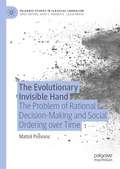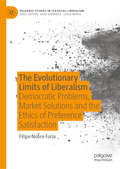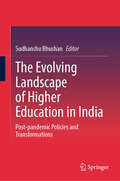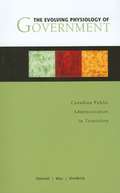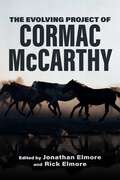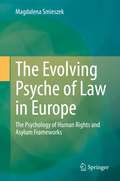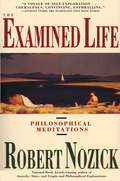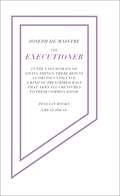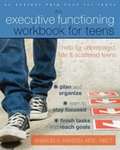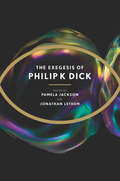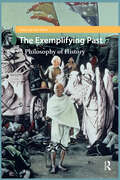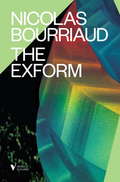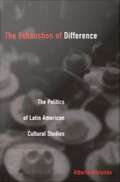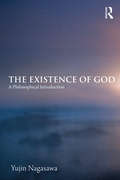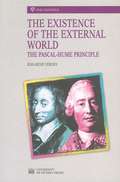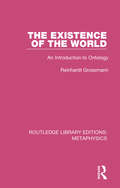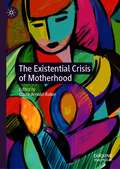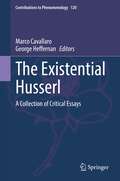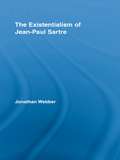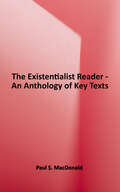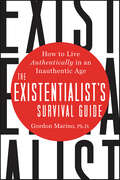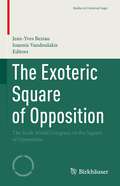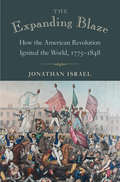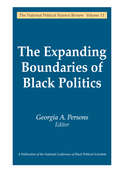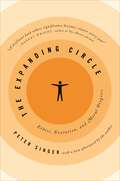- Table View
- List View
The Evolutionary Invisible Hand: The Problem of Rational Decision-Making and Social Ordering over Time (Palgrave Studies in Classical Liberalism)
by Matúš PošvancThe book presents a new theoretical approach to the description of economic phenomena over time. A realistic and meaningful description of economic phenomena over time is one of the basic preconditions for the success of any economic theory. The presented theoretical solution or proposal has two main characteristics. The first is a modification of the theory of subjective value in the form of the claim that one perceives the satisfaction of one's needs in the context of one's overall individual portfolio of goods. The causal relationship of the “old” theory in the form of “need is satisfied by good” is modified in terms of “sum of needs is satisfied by portfolio of goods (sum of goods)”. This is a small modification, which, however, brings several important elements to the description of economic phenomena over time. The old theoretical approach did not enable us to operate over time because of different value context of goods which is changing over time. However, the portfolio of goods is, in fact, a formally-logical homogeneous construction of the mind, which is applicable over time. The second characteristic is the anchoring of this modification of the theory of subjective value in evolutionary (intersubjective) apriorism. The book will be of interest to any Austrian and Mainstream Economists who deal with problems of description of economic phenomena in time. Also, for those involved in topics such as estimating of future, why entrepreneurs are successful or the problem of social ordering or equilibration and those who are interested in the new evolutionary approach to the emergence of criteria for rational decision-making.
The Evolutionary Limits of Liberalism: Democratic Problems, Market Solutions and the Ethics of Preference Satisfaction (Palgrave Studies in Classical Liberalism)
by Filipe Nobre FariaThis book assesses the evolutionary sustainability of liberalism. The book’s central claim is that liberal institutions ultimately weaken their social groups in the evolutionary process of inter-group competition. In this sense, institutions relying on the liberal satisfaction of preferences reveal maladaptive tendencies. Based on the model of multilevel selection, this work appraises the capacity of liberal democracy and free markets to satisfy preferences. In particular, the book re-evaluates public choice theory’s classic postulate that free markets are a suitable alternative to the shortcomings of western liberal democracies regarding preference satisfaction. Yet, the book concludes that free markets are not a solution to the problems of liberal democracy because both market and democratic liberal institutions rest on the liberal satisfaction of preferences, an ethic which hurts group evolutionary fitness. This volume is of interest to political theorists, evolutionary ethicists, political economists and to general readers interested in the future of liberalism.
The Evolving Landscape of Higher Education in India: Post-pandemic Policies and Transformations
by Sudhanshu BhushanThe edited volume discusses the long period of post-colonial developments in higher education in India. It examines the legitimacy of the policies pursued post-pandemic with a focus on the role of teachers and the students' voices. It addresses the essential question of how the technological ascendance in higher education addresses social justice. What is the role of teachers in a new landscape of higher education? It offers insights into the efficiency-centric proposition of the state-market-technology triad, the current paradigm of higher education worldwide. It presents evidence to understand how efficiency has a tradeoff with various aspects of social justice. The authors deal with questions, such as the challenges of privatization and how the commodification of higher education runs counter to the idea of inclusive higher education. The authors critically look at the online form of higher education and how it has led to the shrinkage of democratic spaces in higher education. It discusses the transformative role of teachers with increasing managerialism of higher education. The book highlights a deep understanding of the increasing role of the market and technology and their influence in negating an inclusive and democratic public space in higher education. It appeals to teachers and students by enabling them to understand the market's and technology's impacts on higher education. It has the potential to be a reference book in colleges and universities. It will help the large community of practitioners and policymakers guard against the dangers of overt marketization. The book benefits policymakers, university administrators and teachers, and researchers of higher education interested in governance, technology, teaching, and research in higher education.
The Evolving Physiology of Government: Canadian Public Administration in Transition (Governance Series)
by O. P. Dwivedi Tim A. Mau Byron M. SheldrickCanadian public administration has provided a rich ground for examining the changing nature of the state. Currents of political change have rippled through the administration of the public sector, often producing significant alterations in our understanding of how best to organize and administer public services. This volume brings together some of the leading Canadian and international scholars of public administration to reflect on these changes and their significance. Providing a historical perspective on public administration in Canada, the volume examines the shift from a traditional model of administration to newer forms such as new public management and governance, and explores current debates and the place of Canadian public administration within a broader comparative perspective.
The Evolving Project of Cormac McCarthy
by Ahmed Honeini Dr Vernon W. Cisney Jordan Dominy Alex Harmon Dr Trevor Jackson Dr Peter Lurie Dr John Vanderheide Dr Rachel B. Griffis Mgr. Kateřina Kovářová Dr David DeaconThe Evolving Project of Cormac McCarthy presents eleven essays of original scholarship that undertake a programmatic reassessment of McCarthy’s literary and philosophical worldview. Examining issues of race, morality, history, metaphysics, law, economics, and ecology in McCarthy’s writing reveals how these themes intersect in an overarching, positive gesture that characterizes his work. Taken together, the essays offer a more expansive understanding of McCarthy’s critique of contemporary society, while providing new clarity on his vision of alternate ways of living and community beyond their present life-denying manifestations.
The Evolving Psyche of Law in Europe: The Psychology of Human Rights and Asylum Frameworks
by Magdalena SmieszekThe book applies an interdisciplinary analytical framework, based on social psychology theories of inclusion and exclusion, to a discussion of legal discourse and the development of legal frameworks in Europe concerning migrants, asylum seekers, refugees, and European citizens. It adopts a psycho-historical perspective to discuss the evolution of international and European law with regard to the rights of citizens and asylum-seeking non-citizens, from the law’s inception following the Second World War up to present-day laws and policies. The book reveals the embracing of a European identity based on human rights as the common feature in European treaties and institutions, one that is focused on European citizens and has inclusionary objectives. However, a cognitive dissonance can also be found, as this common identity-making runs counter to national proclivities, as well as securitized, threat-perception-oriented perspectives that can produce exclusionary manifestations concerning persons seeking asylum. In particular, a view of inclusion and exclusion via legal categorizations of status, as well as distributions of social and economic rights, draws attention to the links between social psychology and international law. What emerges in the analysis: a process of creating value is present both at its psychological roots and the expressions of value in the law. Fundamentally speaking, the emergence of laws and policies that center on human beings and human dignity, when understood from a psychological and emotion-based perspective, has the potential to transcend the dissonances identified.
The Examined Life: Philosophical Meditations
by Robert NozickOne of this century’s most original philosophical thinkers, Nozick brilliantly renews Socrates’s quest to uncover the life that is worth living. In brave and moving meditations on love, creativity, happiness, sexuality, parents and children, the Holocaust, religious faith, politics, and wisdom, The Examined Life brings philosophy back to its preeminent subject, the things that matter most. We join in Nozick’s reflections, weighing our experiences and judgments alongside those of past thinkers, to embark upon our own voyages of understanding and change.
The Executioner
by Joseph de MaistreSince their first publication in 1821, de Maistre's dark writings have fascinated and appalled critics, with their relentless hatred of the Enlightenment and view of humans as murderous beasts who can only be controlled by the threat of overwhelming punishment. Terrifying and bizarre, The Executioner is a meditation on human evil like no other.Throughout history, some books have changed the world. They have transformed the way we see ourselves - and each other. They have inspired debate, dissent, war and revolution. They have enlightened, outraged, provoked and comforted. They have enriched lives - and destroyed them. Now Penguin brings you the works of the great thinkers, pioneers, radicals and visionaries whose ideas shook civilization and helped make us who we are.
The Executive Functioning Workbook for Teens: help for unprepared, late & scattered teens
by Sharon A. HansenThe book also includes tips for initiating positive action and change, improving flexibility in thinking, sustaining attention, organizing, planning, enhancing memory, managing emotions, and building self-awareness.
The Exegesis of Philip K. Dick
by Philip K. DickA glimpse into the mind of the bestselling science fiction author through a collection of his personal, metaphysical, religious, visionary writings.Based on thousands of pages of typed and handwritten notes, journal entries, letters, and story sketches, The Exegesis of Philip K. Dick is the magnificent and imaginative final work of an author who dedicated his life to questioning the nature of reality and perception, the malleability of space and time, and the relationship between the human and the divine. Edited and introduced by Pamela Jackson and Jonathan Lethem, this will be the definitive presentation of Dick&’s brilliant, and epic, final work. In The Exegesis, Dick documents his eight-year attempt to fathom what he called &“2-3-74,&” a postmodern visionary experience of the entire universe &“transformed into information.&” In entries that sometimes ran to hundreds of pages, Dick tried to write his way into the heart of a cosmic mystery that tested his powers of imagination and invention to the limit, adding to, revising, and discarding theory after theory, mixing in dreams and visionary experiences as they occurred, and pulling it all together in three late novels known as the VALIS trilogy. In this abridgment, Jackson and Lethem serve as guides, taking the reader through the Exegesis and establishing connections with moments in Dick&’s life and work.The e-book includes a sample chapter from A Scanner Darkly by Philip K. Dick. &“A dyspeptic dystopian&’s mad secret notebooks, imposing order—at least of a kind—on a chaotic world…Fascinating and unsettling.&”—Kirkus Reviews
The Exemplifying Past: A Philosophy of History
by Chiel AkkerThis book addresses a wide range of philosophical problems about history and the semantics of time. The point of departure is the distinction between events under the description of past witnesses and their contemporaries and events under the description of historians. Its main claim is that a thesis on the past is exemplified rather than being justified by the available evidence. Such thesis, the book argues, retroactively becomes concrete in the past under consideration. This book will not only appeal to philosophers and historians, but to students and scholars across the humanities.
The Exform
by Erik Butler Nicolas BourriaudAuthor of the influential Relational Aesthetics examines the dynamics of ideology Leading theorist and art curator Nicolas Bourriaud tackles the excluded, the disposable and the nature of waste by looking to the future of art--the exform. He argues that the great theoretical battles to come will be fought in the realms of ideology, psychoanalysis and art. A "realist" theory and practice must begin by uncovering the mechanisms that create the distinctions between the productive and unproductive, product and waste, and the included and excluded. To do this we must go back to the towering theorist of ideology Louis Althusser and examine how ideology conditions political discourse in ways that normalize cultural, racial and economic practices of exclusion.From the Trade Paperback edition.
The Exhaustion of Difference: The Politics of Latin American Cultural Studies
by Alberto MoreirasThe conditions for thinking about Latin America as a regional unit in transnational academic discourse have shifted over the past decades. In The Exhaustion of Difference Alberto Moreiras ponders the ramifications of this shift and draws on deconstruction, Marxian theory, philosophy, political economy, subaltern studies, literary criticism, and postcolonial studies to interrogate the minimal conditions for an effective critique of knowledge given the recent transformations of the contemporary world. What, asks Moreiras, is the function of critical reason in the present moment? What is regionalistic knowledge in the face of globalization? Can regionalistic knowledge be an effective tool for a critique of contemporary reason? What is the specificity of Latin Americanist reflection and how is it situated to deal with these questions? Through examinations of critical regionalism, restitutional excess, the historical genealogy of Latin American subalternism, testimonio literature, and the cultural politics of magical realism, Moreiras argues that while cultural studies is increasingly institutionalized and in danger of reproducing the dominant ideologies of late capitalism, it is also ripe for giving way to projects of theoretical reformulation. Ultimately, he claims, critical reason must abandon its allegiance to aesthetic-historicist projects and the destructive binaries upon which all cultural theories of modernity have been constructed. The Exhaustion of Difference makes a significant contribution to the rethinking of Latin American cultural studies.
The Existence of God: A Philosophical Introduction
by Yujin NagasawaDoes God exist? What are the various arguments that seek to prove the existence of God? Can atheists refute these arguments? The Existence of God: A Philosophical Introduction assesses classical and contemporary arguments concerning the existence of God: the ontological argument, introducing the nature of existence, possible worlds, parody objections, and the evolutionary origin of the concept of God the cosmological argument, discussing metaphysical paradoxes of infinity, scientific models of the universe, and philosophers’ discussions about ultimate reality and the meaning of life the design argument, addressing Aquinas’s Fifth Way, Darwin’s theory of evolution, the concept of irreducible complexity, and the current controversy over intelligent design and school education. Bringing the subject fully up to date, Yujin Nagasawa explains these arguments in relation to recent research in cognitive science, the mathematics of infinity, big bang cosmology, and debates about ethics and morality in light of contemporary political and social events. The book also includes fascinating insights into the passions, beliefs and struggles of the philosophers and scientists who have tackled the challenge of proving the existence of God, including Thomas Aquinas, and Kurt Gödel - who at the end of his career as a famous mathematician worked on a secret project to prove the existence of God. The Existence of God: A Philosophical Introduction is an ideal gateway to the philosophy of religion and an excellent starting point for anyone interested in arguments about the existence of God.
The Existence of the External World: The Pascal-Hume Principle
by Jean-Rene VernesAlthough thousands of works have been published on the philosophy of knowledge, philosophers have not yet managed to come to a consensus on the fundamental issue: is there a reality that exists outside of consciousness and, if so, how can we prove it? Apart from historical and critical writings, the essential works, those that contemporary thought can use as solid foundations to discover new truths, amount to a few hundred pages at most. We will discuss some of them.
The Existence of the World: An Introduction to Ontology (Routledge Library Editions: Metaphysics)
by Reinhardt GrossmannOriginally published in 1992. The history of Western philosophy can be seen as a battle between those that insist that the "physical universe" exists and those would claim that there is a much larger "world" which contains atemporal and nonspatial things as well. The central part of this book, and the battle, concerns the existence of universals. Starting with the mediaeval definition of the issue found in Porphry and Boethius, the author then considers modern and contemporary versions of the battle. He concludes that what is at stake between naturalists and ontologists is the existence and nature of a number of important categories, like structures, relations, sets, numbers and so on.
The Existential Crisis of Motherhood
by Claire Arnold-BakerThis book offers a new perspective on the motherhood experience. Drawing on existential philosophy and recent phenomenological research into motherhood, the book demonstrates how motherhood can be understood as an existential crisis. It argues that an awareness of the existential issues women face will enable mothers to gain a deeper understanding of the multifaceted aspects of their experience. The book is divided into four sections: Existential Crisis, Maternal Mental Health Crisis, Social Crisis and Working with Existential Crisis, where each section. Each chapter is based on either experiential research or the author’s extensive therapeutic experience of working with mothers and reflects different aspects of the motherhood journey, all through the lens of a philosophical existential approach. The book is essential reading for mental health practitioners and researchers working with mothers, midwives and health visitors, but it is also written for mothers, with the aim to offer new insights on this important life transition.
The Existential Husserl: A Collection of Critical Essays (Contributions to Phenomenology #120)
by Marco Cavallaro George HeffernanThis book examines Husserl’s approach to the question concerning meaning in life and demonstrates that his philosophy includes a phenomenology of existence. Given his critique of the fashionable “philosophy of existence” of the late 1920s and early 1930s, one might think that Husserl posited an opposition between transcendental phenomenology and existential philosophy, as well as that in this respect he differed from existential phenomenologists after him. But texts composed between 1908 and 1937 and recently published in Husserliana XLII, Grenzprobleme der Phänomenologie (2014), show that the existential Husserl was not opposed but open to the phenomenological investigation of several basic topics of a philosophy of existence. A collection of contributions from a team of internationally recognized scholars drawing on these and other sources, the present volume offers insights into the relationship between phenomenology and philosophy of existence. It does so by (1) delineating the basic outlines of Husserl’s phenomenology of existence, (2) reinterpreting the tension between Husserl’s transcendental phenomenology and Jaspers’s and Heidegger’s philosophy of existence as well as Kierkegaard’s and Sartre’s existentialism, and (3) investigating the existential aspects of Husserl’s phenomenological ethics. Thus focusing on neglected aspects of Husserl’s thought, the volume shows that there is a consensus between classical phenomenology and existential phenomenology on the urgency of addressing the existential questions that in The Crisis of the European Sciences and Transcendental Phenomenology (1936) Husserl calls “the questions concerning the meaning or meaninglessness of this entire human existence”. The Existential Husserl represents a major contribution to the clarification of the historical and philosophical developments from transcendental phenomenology to existential phenomenology. The book should appeal to a wide audience of many readers at all levels looking for phenomenological answers to existential questions.
The Existentialism of Jean-Paul Sartre (Routledge Studies in Twentieth-Century Philosophy)
by Jonathan WebberWebber argues for a new interpretation of Sartrean existentialism. On this reading, Sartre is arguing that each person’s character consists in the projects they choose to pursue and that we are all already aware of this but prefer not to face it. Careful consideration of his existentialist writings shows this to be the unifying theme of his theories of consciousness, freedom, the self, bad faith, personal relationships, existential psychoanalysis, and the possibility of authenticity. Developing this account affords many insights into various aspects of his philosophy, not least concerning the origins, structure, and effects of bad faith and the resulting ethic of authenticity. This discussion makes clear the contributions that Sartre’s work can make to current debates over the objectivity of ethics and the psychology of agency, character, and selfhood. Written in an accessible style and illustrated with reference to Sartre’s fiction, this book should appeal to general readers and students as well as to specialists.
The Existentialist Reader: An Anthology of Key Texts
by Paul S. MacDonaldThe Existentialist Reader is a comprehensive anthology of classic philosophical writings from eight key existentialist thinkers: Sartre, Camus, Heidegger, de Beauvoir, Jaspers, Marcel, Merleau-Ponty, and Ortega y Gasset. These substantial and carefully selected readings consider the distinctive concerns of existentialism: absurdity, anxiety, alienation, and death. A comprehensive introduction by Paul S. MacDonald illuminates the existentialist quest for individual freedom and authentic human experience with insight into the historical and intellectual background of these major figures. The Existentialist Reader is a valuable guide to the provocative theories that shook the philosophical world in the 1930s and continue to shape the way we think about ourselves profoundly.
The Existentialist's Survival Guide: How to Live Authentically in an Inauthentic Age
by Gordon Marino“When it comes to living, there’s no getting out alive. But books can help us survive, so to speak, by passing on what is most important about being human before we perish. In The Existentialist’s Survival Guide, Marino has produced an honest and moving book of self-help for readers generally disposed to loathe the genre.” —The Wall Street JournalSophisticated self-help for the 21st century—when every crisis feels like an existential crisisSoren Kierkegaard, Frederick Nietzsche, Jean-Paul Sartre, and other towering figures of existentialism grasped that human beings are, at heart, moody creatures, susceptible to an array of psychological setbacks, crises of faith, flights of fancy, and other emotional ups and downs. Rather than understanding moods—good and bad alike—as afflictions to be treated with pharmaceuticals, this swashbuckling group of thinkers generally known as existentialists believed that such feelings not only offer enduring lessons about living a life of integrity, but also help us discern an inner spark that can inspire spiritual development and personal transformation. To listen to Kierkegaard and company, how we grapple with these feelings shapes who we are, how we act, and, ultimately, the kind of lives we lead. In The Existentialist's Survival Guide, Gordon Marino, director of the Hong Kierkegaard Library at St. Olaf College and boxing correspondent for The Wall Street Journal, recasts the practical takeaways existentialism offers for the twenty-first century. From negotiating angst, depression, despair, and death to practicing faith, morality, and love, Marino dispenses wisdom on how to face existence head-on while keeping our hearts intact, especially when the universe feels like it’s working against us and nothing seems to matter. What emerges are life-altering and, in some cases, lifesaving epiphanies—existential prescriptions for living with integrity, courage, and authenticity in an increasingly chaotic, uncertain, and inauthentic age.
The Exoteric Square of Opposition: The Sixth World Congress on the Square of Opposition (Studies in Universal Logic)
by Jean-Yves Beziau Ioannis VandoulakisThe theory of the square of opposition has been studied for over 2,000 years and has seen a resurgence in new theories and research since the second half of the twentieth century. This volume collects papers presented at the Sixth World Congress on the Square of Opposition, held in Crete in 2018, developing an interdisciplinary exploration of the theory. Chapter authors explore subjects such as Aristotle’s ontological square, logical oppositions in Avicenna’s hypothetical logic, and the power of the square of opposition to solve theological problems regarding predestination and theodicy. Other topics covered include:Hegel’s opposition to diagramsDe Morgan’s unpublished octagon of opposition turnstile figures of oppositioninstitutional model-theoretic treatment of oppositionsLacan’s four formulas of sexuationthe theory of oppositional poly-simplexesThe Exoteric Square of Opposition will appeal to pure logicians, historians of logic, semioticians, philosophers, theologians, mathematicians, and psychoanalysts.
The Expanding Blaze: How the American Revolution Ignited the World, 1775-1848
by Jonathan IsraelA major intellectual history of the American Revolution and its influence on later revolutions in Europe and the AmericasThe Expanding Blaze is a sweeping history of how the American Revolution inspired revolutions throughout Europe and the Atlantic world in the eighteenth and nineteenth centuries. Jonathan Israel, one of the world’s leading historians of the Enlightenment, shows how the radical ideas of American founders such as Paine, Jefferson, Franklin, Madison, and Monroe set the pattern for democratic revolutions, movements, and constitutions in France, Britain, Ireland, the Netherlands, Belgium, Poland, Greece, Canada, Haiti, Brazil, and Spanish America.The Expanding Blaze reminds us that the American Revolution was an astonishingly radical event—and that it didn’t end with the transformation and independence of America. Rather, the Revolution continued to reverberate in Europe and the Americas for the next three-quarters of a century. This comprehensive history of the Revolution’s international influence traces how American efforts to implement Radical Enlightenment ideas—including the destruction of the old regime and the promotion of democratic republicanism, self-government, and liberty—helped drive revolutions abroad, as foreign leaders explicitly followed the American example and espoused American democratic values.The first major new intellectual history of the age of democratic revolution in decades, The Expanding Blaze returns the American Revolution to its global context.
The Expanding Boundaries of Black Politics (National Political Science Review Ser. #Vol. 11)
by Anthony WohlThis volume joins the preceding volumes in this distinguished series in presenting contemporary research by leading political scientists addressing topics of interest to those concerned with African-American affairs. It captures the expanding boundaries of black politics and the persistent interests of the black community at large.The anchoring symposium, ""The Expanding Boundaries of Black Politics,"" presents the scholarship of a cadre of young black political scientists actively engaged in the critical tasks of moving forward the study of black politics. Their concerns include expanding the boundaries of black politics along the lines of epistemology and methodology, especially in regard to core issues and areas within this field. In an introductory essay by Todd Shaw, the work of these scholars is situated within the context of temporal shifts in scholarly emphases. Overlapping issues and concerns across time as well as black political scholarship as defined in the field since its beginning are addressed.The second part of this volume, entitled ""Maximizing the Black Vote; Recognizing the Limits of Electoral Politics,"" concentrates on serious lingering social concerns. These include the policy significance of black mayors affecting the concomitant impact of the black vote, the boundaries being pushed concerning the conjunction of black theology and sexual identity, a gendered analysis of familial policies, and the deepening social and economic plight of young black males including felon disfranchisement.The Expanding Boundaries of Black Politics carries forth the search for an understanding of the relationship between religion, the black church, and black political behavior; cross-racial group coalitions as concerns matters of immigration, growing multiculturalism, and the impact on black politics; maximizing the impact of the black vote focusing on voting rights enforcement, the black vote in presidential elections, and the voice of the Congressional Black Caucus
The Expanding Circle: Ethics, Evolution, and Moral Progress
by Peter SingerWhat is ethics? Where do moral standards come from? Are they based on emotions, reason, or some innate sense of right and wrong? For many scientists, the key lies entirely in biology--especially in Darwinian theories of evolution and self-preservation. But if evolution is a struggle for survival, why are we still capable of altruism? In his classic study The Expanding Circle, Peter Singer argues that altruism began as a genetically based drive to protect one's kin and community members but has developed into a consciously chosen ethic with an expanding circle of moral concern. Drawing on philosophy and evolutionary psychology, he demonstrates that human ethics cannot be explained by biology alone. Rather, it is our capacity for reasoning that makes moral progress possible. In a new afterword, Singer takes stock of his argument in light of recent research on the evolution of morality.
